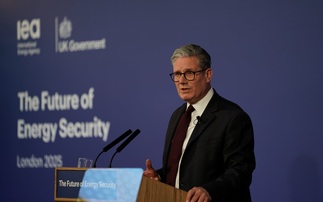Shri Prakash Javadekar says rich countries need to be more flexible, as 'high ambition coalition' reiterates its red lines
India has today confirmed fundamental divisions remain between rich and poor countries at the climate change talks taking place in Paris this week, threatening to block a final deal unless industrialised nations show more flexibility.
However, at the same time the self-styled 'high ambition coalition' of industrialised and developing nations announced Brazil has joined the group and will throw its weight behind calls for a wide-reaching and ambitious agreement.
Shri Prakash Javadekar, Indian Environment, Forests and Climate Change Minister, said the developed world was not showing the "spirit of accommodation" that was demanded by French President Francois Hollande prior to the start of the COP21 talks.
"French President Hollande has warned earlier, twice, that if the developed world doesn't show the spirit of accommodation then Paris success is not guaranteed," he said. "That is what French president Hollande has said and that is what I repeat."
Observers said India has been one of the most combative countries at this year's talks, strongly resisting calls from industrialised nations for a rethink of how developed and developing nations are differentiated in any agreement. India has also repeatedly rejected a report from the think tank, OECD, which shows rich countries are more than half way towards delivering on its $100bn per year climate finance commitment.
"It's about equity and climate justice is what is needed," said Javadekar. China and India say they should not be subjected to the same requirements as the most developed industrialised nations, fearing the proposed Paris deal will lock them into delivering increased levels of climate finance for poorer countries and steeper emissions reductions that could derail their economic development.
But industrialised economies, such as the US and European Union, want the new text to recognise that the world has moved on significantly since the UN's climate convention was drawn up more than 20 years ago. They argue many emerging economies should be making a bigger contribution to tackling warming temperatures, particularly given some nations classified as developing are now amongst the richest nations in the world.
Today German Environment Minister Barbara Hendricks restated the EU's position, telling reporters "We are not against differentiation, we are all for the system where different players contribute as much as they can," she said.
But Javadekar said he was striving for a "just and equitable accord" and accused developed countries of being unaccommodating.
"We are very concerned about seven billion people of the world. We need to assure them that we are here to collectively declare our intention to walk the talk and walk the cleaner the path so that the world will be much better and there will be no ill impacts of climate change on them," he said.
"But unfortunately the developing world is accommodating; the developed world is not accommodating and is not showing flexibility. There is need for them to show more flexibility. And they should be more accommodating to the concerns of the developing world and poor countries all countries."
However, this afternoon there were signs the bloc of emerging economies and Gulf states that have been accused of blocking progress towards a deal is becoming increasingly isolated.
Marshall Islands' Tony De Brum, chair of the 'High Ambition Coalition', announced Brazil had joined the group and confirmed Philippines would follow later this afternoon.
He added the group was not willing to give up on any of its demands, including a 1.5C temperature goal, a long term emissions target, and five year system of reviews for INDCs. "None of the countries here can go home without the ambition we will fight for," he said, stressing that Ministers were prepared to work through the night to defend its position. "We are not here to accept a minimalist Paris agreement, this is our red line," he added.
He accused a group of countries of mounting a co-ordinated attempt last night to "gut" the text of ambition.
He also said the coalition was gaining momentum, with Iceland, Switzerland, and Canada following in the footsteps of the US and signing up to the group in the last 24 hours.
De Brum rejected suggestions China, India and South Africa had not been invited to join the group. He said there was an open invitation for any country that backs a high ambition deal to join the coalition.
Greenpeace's Martin Kaiser said Brazil's backing for the coalition could prove a "game-changer" for the talks.
"This move by Brazil could change the whole dynamic in the last closing hours of this conference," he said. "We welcome that the High Ambition Coalition is championing the issues which are critical to the agreement - a temperature limit of 1.5C, a strong long term goal of decarbonisation, five-year cycles for reviewing climate actions and clear transparency rules.
"Missing from the coalition were any of the major emerging economies. With this move, Brazil can become a bridge builder to the others."
This article is part of BusinessGreen's Road to Paris hub, hosted in association with PwC.







